Exam 4: Price Controls and Quotas: Meddling With Markets
Exam 1: First Principles183 Questions
Exam 2: Economic Models: Trade-Offs and Trade341 Questions
Exam 3: Supply and Demand230 Questions
Exam 4: Price Controls and Quotas: Meddling With Markets187 Questions
Exam 5: International Trade224 Questions
Exam 6: Macroeconomics: the Big Picture128 Questions
Exam 7: GDP and the CPI: Tracking the Macroeconomy213 Questions
Exam 8: Unemployment and Inflation300 Questions
Exam 9: Long-Run Economic Growth268 Questions
Exam 10: Savings, Investment Spending, and the Financial Syst355 Questions
Exam 11: Income and Expenditure114 Questions
Exam 12: Aggregate Demand and Aggregate Supply308 Questions
Exam 13: Fiscal Policy120 Questions
Exam 14: Money, Banking, and the Federal Reserve System135 Questions
Exam 15: Monetary Policy316 Questions
Exam 16: Inflation, Disinflation, and Deflation194 Questions
Exam 17: Macroeconomics: Events and Ideas283 Questions
Exam 18: International Macroeconomics411 Questions
Select questions type
Use the following to answer questions: 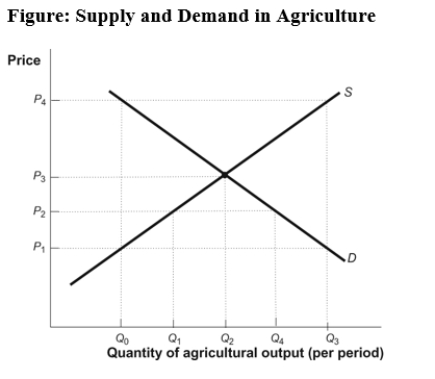 -(Figure: Supply and Demand in Agriculture) Use Figure: Supply and Demand in Agriculture. The government could help increase some farmers' income by setting a price _____ at _____, causing a _____ of _____.
-(Figure: Supply and Demand in Agriculture) Use Figure: Supply and Demand in Agriculture. The government could help increase some farmers' income by setting a price _____ at _____, causing a _____ of _____.
(Multiple Choice)
4.7/5  (33)
(33)
Suppose the NFL wants to give the "common fan" the opportunity to attend the Super Bowl, so it sets Super Bowl prices "low"-let's say they set ticket prices for a regular seat at Super Bowl LI to cost just $400. People who have tickets, however, can turn around and sell them online for $1,500 or more. If there are no transaction costs for fans with tickets to sell them, the true cost to a fan of attending Super Bowl LI is:
(Multiple Choice)
4.9/5  (45)
(45)
The United States and the European Union impose price floors on many agricultural products. These price floors lead to unwanted surpluses. To deal with a surplus:
(Multiple Choice)
4.8/5  (34)
(34)
Licenses allowing taxis to operate issued by New York City in the 1930s are called medallions.
(True/False)
4.9/5  (31)
(31)
Use the following to answer questions: 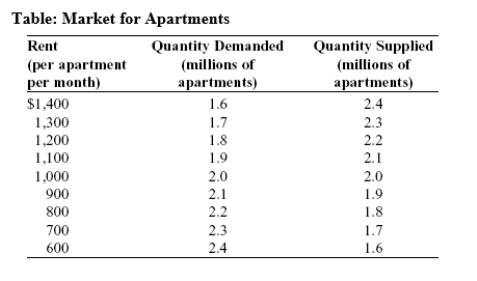 -(Table: Market for Apartments) Use Table: Market for Apartments. If a government price ceiling of $600 is imposed on this market, the result will be an inefficiency in the form of a _____ million apartments.
-(Table: Market for Apartments) Use Table: Market for Apartments. If a government price ceiling of $600 is imposed on this market, the result will be an inefficiency in the form of a _____ million apartments.
(Multiple Choice)
4.8/5  (39)
(39)
Although they cost more than $200,000 when they were issued in the 1930s, the New York taxicab medallions are relatively inexpensive today, selling for around $3,000.
(True/False)
4.9/5  (37)
(37)
Suppose the U.S. government imposes a binding quota on the number of Japanese-made cars allowed into the United States. Assuming that Japanese-made cars and U.S.-made cars are substitutes in consumption, we would expect the price of Japanese cars to _____ and the price of U.S.-made cars to _____.
(Multiple Choice)
4.8/5  (38)
(38)
Use the following to answer questions: 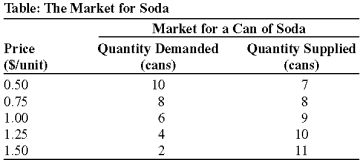 -(Table: The Market for Soda) Use Table: The Market for Soda. If the government imposes a price ceiling of $1 per can of soda, the quantity of soda demanded will be _____ cans.
-(Table: The Market for Soda) Use Table: The Market for Soda. If the government imposes a price ceiling of $1 per can of soda, the quantity of soda demanded will be _____ cans.
(Multiple Choice)
4.9/5  (36)
(36)
Use the following to answer questions: 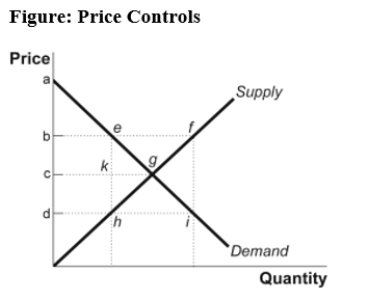 -(Figure: Price Controls) Use Figure: Price Controls. The consumer surplus lost to a price floor at point b is equal to the area:
-(Figure: Price Controls) Use Figure: Price Controls. The consumer surplus lost to a price floor at point b is equal to the area:
(Multiple Choice)
4.8/5  (34)
(34)
The most likely reason that the government implements a price _____ is because it feels the price is too high for _____.
(Multiple Choice)
4.9/5  (31)
(31)
(Figure: The Market for Spanish Textbooks) Use Figure: The Market for Spanish Textbooks. Suppose the government believes the producers of Spanish textbooks are not profitable, and it wants to make sure textbook producers are profitable. It could impose a control called a price _____, and for it to be binding, one possible price would be _____. 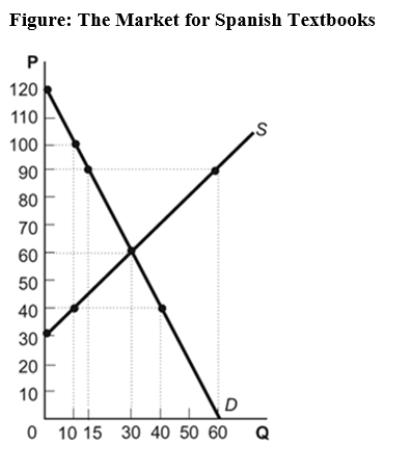
(Multiple Choice)
4.9/5  (40)
(40)
Use the following to answer questions: 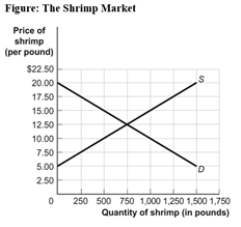 -(Figure: The Shrimp Market) Use Figure: The Shrimp Market. If the government imposes a quota limiting sales of shrimp to 1,000 pounds, the quota rent per pound is:
-(Figure: The Shrimp Market) Use Figure: The Shrimp Market. If the government imposes a quota limiting sales of shrimp to 1,000 pounds, the quota rent per pound is:
(Multiple Choice)
4.8/5  (31)
(31)
The National Football League does not license quarterbacks. This means that the free market determines the standards that an aspiring quarterback must achieve.
(True/False)
4.7/5  (37)
(37)
Suppose the state of Mississippi sets a price floor in the market for cotton. If the floor is set below the market-clearing price of cotton, the floor will cause a surplus of cotton.
(True/False)
4.9/5  (33)
(33)
Showing 61 - 80 of 187
Filters
- Essay(0)
- Multiple Choice(0)
- Short Answer(0)
- True False(0)
- Matching(0)